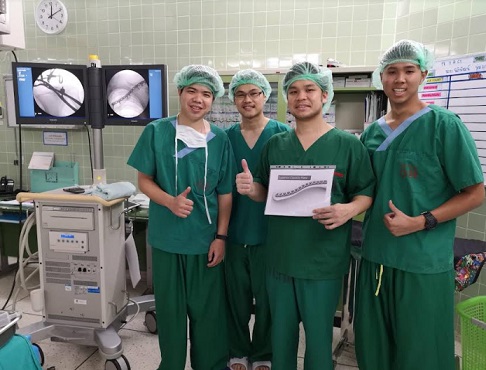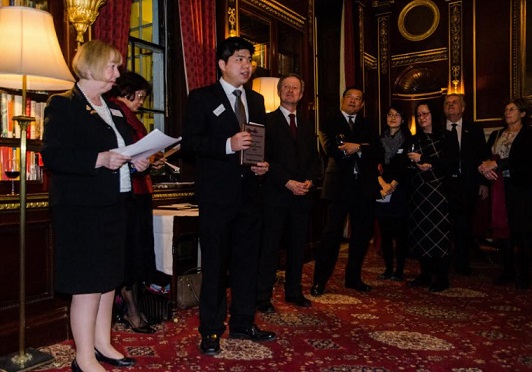Overseas study is the dream of many, and those who achieve it have their different goals and inspirations.
In a world of diverse cultures and lifestyles, which can be very different from one’s hometown, the rewards of overseas study can be more than merely knowledge gained in a classroom. This is the case for the four Thai winners of the Study UK Alumni Awards this year. They have accumulated learning, experience and new ideas which cannot be found elsewhere, and developed them into things of value for communities, society and the country.
The British Council interviewed the four alumni who have won the Study UK Alumni Awards 2021-22. They have brought great benefits to the country in four fields: Science and Sustainability, Culture and Creativity, Social Action and Business Innovation. They talk about the experience of living and learning in a foreign university, to inspire others who might be thinking of travel to study abroad, and to the United Kingdom in particular.
- More than knowledge, “critical thinking” is the simple road to success
Asst. Prof. Sarayut Rueangsuwan is a co-founder of CABB Taxi, a manufacturer and provider of the CABB taxi service platform modelled on London’s legendary taxi cabs, and the winner of the Study UK Alumni Award for Business and Innovation. He explained, “My study life in the UK was both enjoyable and challenging. At first, I felt that the subject I had chosen was very difficult, while I did not have any Thai friends. This put me under pressure in the beginning, to the extent that I even thought of quitting. However, with support from my family, friends and teachers I was able to get through this part. I now see that besides new and useful knowledge, and learning about cultural diversity from friends with different ethnic backgrounds, the greatest thing I got from study in the UK was “critical thinking”, which is different from education in Thailand. We are usually forced into rote memorization, or if anybody comes up with an unusual question they are seen as an anomaly. However in the UK they teach you to think systematically, and train your thinking processes with the idea that there is no wrong answer. However you answer it depends, it is an opinion. That is what I brought back to my work. For instance in a meeting, I generally give an opportunity for every attendee to have some input and share their perspectives to the fullest extent. For me, this yields an optimal outcome, better than just one person’s ideas. This includes the origins of CABB, which started from the basic problems of taxis in Thailand encountered every day. It is not too complicated, but nobody has really tried to address the problems. I have attempted to solve simple matters with simple methods, and this simplicity delivers efficient results. That is why I believe, ‘Simplicity is the most beautiful’”.
- A city of intellectual freedom and an atmosphere to stimulate creative ideas
Assist. Prof. Supitcha Tovivich, a lecturer at the Faculty of Architecture, Silpakorn University and winner of Study UK Alumni’s Culture and Creativity Award whose passion is in the role of design intervention and participatory placemaking. She related that, “Studying in the UK was a crucial turning point to increase my own potential to the present day. It gave me a wider picture of architecture and the role of design. It made me see the relationship between architecture and society, economics and politics. Doing my doctorate in London gave me the opportunity to listen to talks and visit exhibitions, including very small galleries. Thus I became aware that besides learning in the classroom, what was outside the classroom was helping to build my world. London is a city of very smart people sharing their ideas freely and naturally, and exchanging knowledge. It is also a city where someone can live alone happily, because whatever your passion, this city has a community to welcome you. This is how I got to meet like-minded people. London is also incredibly diverse in terms of people and activities, but everybody can live together. This atmosphere is greatly conducive to stimulating creative ideas. My fellow alumni now work in an academic network of mutual reliance, and we are still very close, because we lived together abroad. As well as teaching us to live together with other people, we were also together with friends studying other subjects.”
- Guidelines of developing research to meet needs and create genuine value
Assist. Prof. Dr. Chedtha Puncreobutr, Lecturer, Department of Metallurgical Engineering, Chulalongkorn University, is winner of the Science and Sustainability Award of the Study UK Alumni. He has innovated with cutting-edge technology using a combination of 3D printing technology and AI to bring custom-made affordable bone prostheses to Thai patients. He said, “The thing that most impressed me from studying in the UK which I would like to share with you are three guidelines for teaching. 1. Looking at the end result of the research and understanding who will use this thing we are developing and how. This opens a window on research, that besides being a new thing, it has to meet a genuine user need to be truly useful. 2. Global Thinking is about how to meet needs for the entire global population, and not just one group. This comes from a diversity of experience meeting friends from many different countries and cultures. 3. Teaching me not to become attached to previous knowledge, but making me think up new things to apply to what we are facing in the context of global society. When I returned, I thought that if I develop something inside the country, I should be using the same principles. I must do research that is both new and meets a specific use case in the country. I applied my knowledge in materials engineering and 3D printing for research on the development of medical equipment meeting genuine user needs, rather than just working in a lab. I collaborated with medical experts to hear their perspective and exchange opinions. This gave me a picture of the end user from the get-go. As a result, our performance was not just development, but truly helpful to patients. In the last 4-5 years, we have helped over 600 people.”
“In the past I have had the opportunity to work with fellow UK alumni, both Thai and foreign students. Some of them went to work in various research institutes so I have had many opportunities to collaborate with them in research. The alumni who graduated at the same time have had the opportunity to do collaborative research in the UK. It was possible to request additional funding from the Newton Fund, a joint Thai-UK research fund to promote research collaboration between the two countries. I think that this strong network helps us to get to know people in this field, to exchange ideas and collaborate in the future after graduation,” said Prof. Chedtha.
- Extending a quality network as a key driver of social transformation
Miss Tidarat Yingcharoen, an advocate for education equity via independent organizations and political party platforms is a UK alumna winning the Social Action Award. She explained, “My her classmates studying for a masters came from over 60 countries around the world. They had a broad diversity of backgrounds, occupations and aspirations. This enabled a widespread exchange of ideas so I could develop myself with this diversity. After I graduated with a Master’s in Public Policy, I went back to work to support educational policies to promote education equity. I represent marginalized groups such as the stateless, young people and women. I amplify voices who want to see society improved. The various networks of the UK have been an enormous help with social policies. As well as being on the alumni committee for the Chevening scholarship, a group of people from many sectors, I was a recipient of funds from the Oxford Thai Foundation. Being part of the British Council’s UK Alumni network has enabled me to meet friends with many special abilities, who have been successful in many professions. They have been a crucial source of mutual support, whether giving advice, or being the lever for us to have more public space. They have been supportive of our efforts for things which are beneficial to society, and education in particular, to which is everybody’s priority.”
These four winners, together with the other eight finalists from Thailand will also be entering the UK Alumni Awards global level competition, and the global finalists are to be announced in May 2022. Stay tuned for more information on the British Council’s website www.britishcouncil.or.th, or on the Facebook page of British Council Thailand


